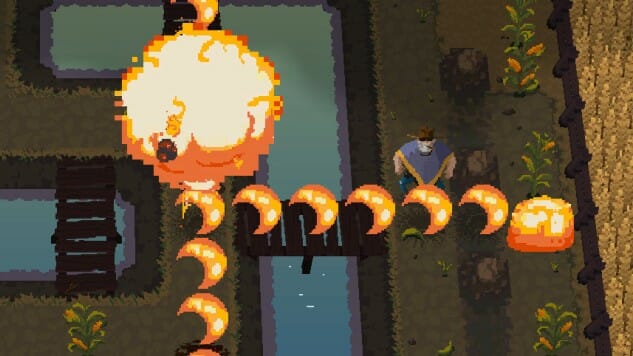Bombslinger Proves That Procedural Generation Isn’t Right for Every Genre
Games Features Bombslinger
The world’s an unstable, unpredictable place. Do we really want more instability from our videogames?
During a couple of transatlantic flights last week I spent a lot of time playing Bombslinger, which was recently released on the Switch. It’s a Spelunkified take on Bomberman, a rogue-lite deconstruction of Hudson Soft’s grid-based blastathon, and it changes with every play. There’s a bit of Zelda’s 8-bit dungeons in its map layouts, which reads like a tip of the hat to The Binding of Isaac, and it’s all wrapped up in a Western-themed story about a gang of bandits who turn on one of their own and leave him for dead. If you’re looking for a quick jolt of Bomberman-esque action during an interminable flight, and didn’t appreciate that unloved Bomberman sequel that Konami released last year, this is about the best you can do on the Switch right now.
At the most basic level Bombslinger works well as a game. Planting bombs to take out enemies, ducking the fire that always erupts out in a cross formation, unlocking new rooms and uncovering power-ups that add depth to the strategy is a loop that nicely weaves stress, relaxation and entertainment together. And many of the various abilities that can be acquired expand past that basic Bomberman template, uniting with the vastly different theme to create a fresh identity that tentatively escapes the shadow of its influences. It’s not just a spin on nostalgia.
The biggest change, though, is that roguelike structure. In Bombslinger the level design changes every time you play it. Every screen is procedurally generated, with an ever-changing arrangement of enemies, treasure chests, items and the other elements that go into every stage. The game ends as soon as my character dies for the first time (although one particular item lets me continue from that spot with a single heart), and when I start it up again I’ll have a freshly remixed bit of turf to explore.
That level of randomness has been a central aspect of so many great games in the past, from Spelunky to Rogue Legacy. It doesn’t quite gel with the rest of Bombslinger, though. This is essentially a puzzle game, where each screen is a new problem with a variety of solutions. Even open-ended puzzles need to be carefully crafted, but the presence of an algorithm instead of a more deliberate creator is almost always felt in Bombslinger. There’s no flow to the level of difficulty as I move from room to room—one will be a sprawling chamber that creeps past the edges of the screen, with several deadly foes prowling about, and then the very next room will be less than half that size and with only a small handful of the most basic enemies in the game. Also solving a puzzle should make me feel like I outsmarted it, but when I survive a stage in Bombslinger it’s often because the game generated an easier-than-usual level. Instead of the expert, incremental escalation expected from games like this, Bombslinger fluctuates unpredictably, undermining the game’s puzzles and turning luck into too great of a factor in a successful run.
Level design is hard, and the waning buzz around procedural generation hasn’t entirely died down yet. It makes sense why developer Mode4 would take this route. Still, Bombslinger would be a stronger game if it had a more focused and adept approach to its levels. Rigid design might make the game less replayable, but it would make the moments when one does play it more powerful.
This instability doesn’t ruin Bombslinger. As I said, it’s still an entirely appropriate way to kill some time. I don’t regret firing it up at 35000 feet during my journey. The roguelike approach was clearly the wrong direction, though. It hurts the quality of the game’s level design, and also makes the whole project feel like it’s chasing a trend that was already starting to lose steam years ago. Bombslinger isn’t a bomb, but it’s also not the blast it could’ve been.
Garrett Martin edits Paste’s comedy and games sections. He’s on Twitter @grmartin.